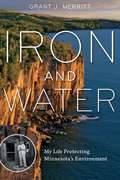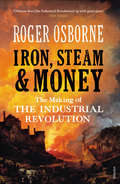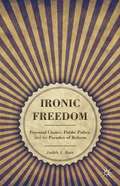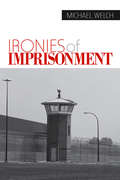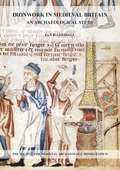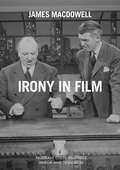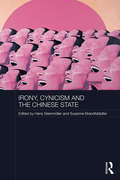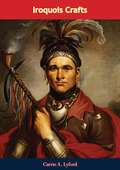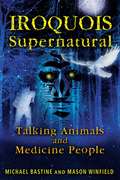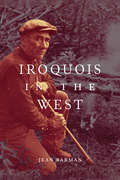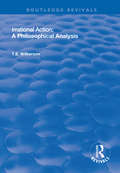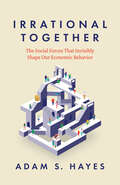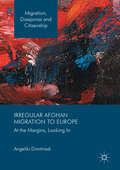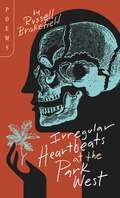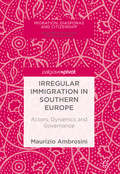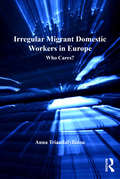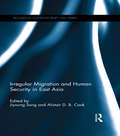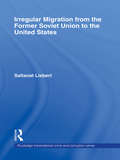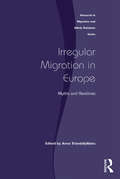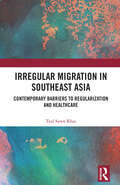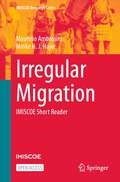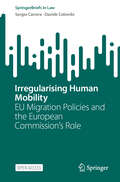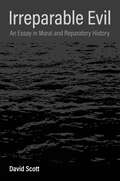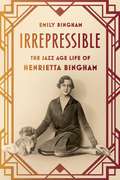- Table View
- List View
Iron and Water: My Life Protecting Minnesota's Environment
by Grant J. MerrittA memoir of family, mining pioneers and unscrupulous magnates, and the fight for Minnesota&’s natural resources In 1855 the Merritt family arrived in Minnesota, where a descendant, Alfred, would one day become one of the &“Seven Iron Men&”—builders of the first mines to tap the state&’s great mineral wealth in the Mesabi Range. Another Merritt, more than half a century later, would lead the efforts to protect Lake Superior from damage caused by mining. Iron and Water is Grant J. Merritt&’s memoir of his life&’s work on behalf of Minnesota&’s people and environment and also the story of a significant family in state history.Merritt&’s family played a key role in the struggle over natural resources in Minnesota—for the enrichment of mining pioneers, the prosperity of the state and its people, and the prospect of a secure and healthy future. This complex tale begins with the adventure of discovering iron ore and building the mines, railroads, and docks to move it, then devolves into the intrigues of business partnerships gone bad and attempts by John D. Rockefeller to defraud the Merritts. What follows is an engrossing account of Grant Merritt&’s years in the halls of state politics and the trenches of environmental activism in defense of Minnesota&’s North Shore and Lake Superior&’s waters. The author&’s tenure as head of the Minnesota Pollution Control Agency under Governor Wendell Anderson and his service on the first board of the Minnesota Environmental Quality Council take us behind the scenes of landmark legal cases and crucial moments in Minnesota history—particularly the notable Reserve Mining case, in which the company was found liable for serious environmental and health threats on the shores of Lake Superior and ordered to be shut down. In these pages we encounter the people who were critical to this history, from robber baron Rockefeller to judges, activists, and politicians, including Walter Mondale and Jim Oberstar. In chronicling both the discovery of vast iron deposits on the Mesabi Range and the fight to save Lake Superior and Minnesota&’s natural riches, Iron and Water reveals how, whether alone or together, individuals wield the power to change the world.
Iron, Steam & Money: The Making of the Industrial Revolution
by Roger OsborneIn late eighteenth-century Britain a handful of men brought about the greatest transformation in human history. Inventors, industrialists and entrepreneurs ushered in the age of powered machinery and the factory, and thereby changed the whole of human society, bringing into being new methods of social and economic organisation, new social classes, and new political forces. The Industrial Revolution also dramatically altered humanity's relation to the natural world and embedded the belief that change, not stasis, is the necessary backdrop for human existence.Iron, Steam and Money tells the thrilling story of those few decades, the moments of inspiration, the rivalries, skulduggery and death threats, and the tireless perseverance of the visionaries who made it all happen. Richard Arkwright, James Watt, Richard Trevithick and Josiah Wedgwood are among the giants whose achievements and tragedies fill these pages. In this authoritative study Roger Osborne also shows how and why the revolution happened, revealing pre-industrial Britain as a surprisingly affluent society, with wealth spread widely through the population, and with craft industries in every town, village and front parlour. The combination of disposable income, widespread demand for industrial goods, and a generation of time-served artisans created the unique conditions that propelled humanity into the modern world.The industrial revolution was arguably the most important episode in modern human history; Iron, Steam and Money reminds us of its central role, while showing the extraordinary excitement of those tumultuous decades.
Ironic Freedom: Personal Choice, Public Policy, and the Paradox of Reform
by Judith BaerIronic Freedom asserts that freedom from governmental interference may make people vulnerable to other sources of coercion; these affects vary by gender, race, and class. Increasing negative freedoms may reinforce existing asymmetrical power relationships within society.
Ironies of Imprisonment: Social Control And The Ironies Of Imprisonment
by Michael WelchFrom the Foreword "Michael Welch′s book is an invitation to think. It is an invitation to grow intellectually and critically, as a consumer of crime policy and an observer of the American scene. Written by a scholar who has dedicated his work to uncovering the hidden ironies of formal crime policy, this is a collection of essays of depth and significance." -Todd R. Clear, Distinguished Professor, John Jay College of Criminal Justice Praise for Ironies of Imprisonment:"The American correctional system is too often misshaped by a toxic mixture of ideology, anti-intellectualism, wishful thinking, and structural interests. Michael Welch uses his substantial critical skills to illuminate how these various factors intersect to create policies and practices that produce, in the end, more injustice and less public safety. His sobering analysis deconstructs the rhetoric used to justify mass imprisonment and its unanticipated, disquieting consequences."-Frank Cullen, University of Cincinnati "Michael Welch has written a book which anyone who is looking for an alternative to conventional and conservative approaches to prisons and punishment should read. Welch provides the groundwork for the development of a penology which engages critically with the growing tensions and ironies of imprisonment." -Roger Matthews, Middlesex University Ironies of Imprisonment examines in-depth an array of problems confronting correctional programs and policies from the author′s singular and consistent critical viewpoint. The book challenges the prevailing logic of mass incarceration and traces the ironies of imprisonment to their root causes, manifesting in social, political, economic, and racial inequality. Key Features A compelling Foreword written by Todd E. Clear, an internationally recognized leader in the field of criminal justice. Chapters open with illuminating real-life vignettes and end with provocative review questions. The author′s knowledgeable and dynamic voice provides a consistent perspective on key issues such as the war on drugs, the war on terror, prison violence, capital punishment, health care, and the prison industry. Up-to-date presentation of pertinent subject matter, including chief developments in research and theory. Discussion of the problems facing corrections in a post-September 11th world. Unique and accessible, this book promises to stimulate spirited discussion and debate over the use of prisons. Ironies of Imprisonment is recommended reading for students in corrections classes at the undergraduate and graduate levels in sociology, criminology, and criminal justice departments. In addition, it can be used in conjunction with a core text in courses on policy, theories of punishment, and social problems. The book will also be of interest to a general audience interested in reading about incarceration. Michael Welch is the author of numerous articles and several books on the subject of punishment and social control, including Punishment in America (1999), Flag Burning: Moral Panic and the Criminalization of Protest (2000), and Detained: Immigration Laws and the Expanding I.N.S. Jail Complex (2002). He has correctional experience at the federal, state, and local levels. Welch received a Ph.D. in sociology from the University of North Texas, Denton and is Associate Professor of Criminal Justice at Rutgers University.
Ironwork in Medieval Britain: An Archaeological Study (The Society for Medieval Archaeology Monographs)
by Ian H. Goodall"This monograph is the definitive survey of iron tools and other fittings in use during the period c1066 to 1540AD. Exceptional in a north-western European context for its range and coverage of artefacts from both rural and urban excavations, much of the material described here was recovered during 'rescue' projects in the 1960s and 1970s funded by the State through the Ministry of Public Works and Buildings and their successors. The text contains almost everything necessary to identify, date and understand medieval iron objects. In scope and detail there is still no published parallel and, as such, it will be essential for almost any archaeologist working in later medieval archaeology, particularly in the fields of excavation, finds study, museums and research."
Irony in Film (Palgrave Close Readings in Film and Television)
by James MacdowellIrony in Film is the first book about ironic expression in this medium. We often feel the need to call films or aspects of them ironic; but what exactly does this mean? How do films create irony? Might certain features of the medium help or hinder its ironic potential? How can we know we are justified in dubbing any film or moment ironic? This book attempts to answer such questions, investigating in the process crucial and under-examined issues that irony raises for our understanding of narrative filmmaking.A much-debated subject in other disciplines, in film scholarship irony is habitually referred to but too seldom explored. Combining in-depth theorising with detailed close analysis, this pioneering study asks what ironic capacities films might possess, how film style may be used ironically, and what role intention should play in film interpretation. The proposed answers have significance for our understanding of not only ironic filmmaking, but the nature of expression in this medium.
Irony, Cynicism and the Chinese State (Routledge Contemporary China Series)
by Hans Steinmüller Susanne BrandtstädterUnprecedented social change in China has intensified the contradictions faced by ordinary people. In everyday life, people find themselves caught between official and popular discourses, encounter radically different representations of China's past and its future, and draw on widely diverse moral frameworks. This volume explores irony and cynicism as part of the social life of local communities in China, and specifically in relation to the contemporary Chinese state. It collects ethnographies of irony and cynicism in social action, written by a group of anthropologists who specialise in China. They use the lenses of irony and cynicism - broadly defined to include resignation, resistance, humour, ambiguity and dialogue - to look anew at the social, political and moral contradictions faced by Chinese people. The various contributions are concerned with both the interpretation of intentions in everyday social action and discourse, and the broader theoretical consequences of such interpretations for an understanding of the Chinese state. As a study of irony and cynicism in modern China and their implications on the social and political aspects of everyday life, this book will be of huge interest to students and scholars of social and cultural anthropology, Chinese culture and society, and Chinese politics.
Iroquois Crafts
by Carrie A. LyfordThere is nothing more colorful in the North American Indian history than the story of the League of the Iroquois. An Iroquois Indian crafts manual with photographs, and drawings of examples, historical background, patterns of clothing, bark utensils and decorative arts.
Iroquois Supernatural: Talking Animals and Medicine People
by Mason Winfield Michael BastineBrings the paranormal beings and places of the Iroquois folklore tradition to life through historic and contemporary accounts of otherworldly encounters • Recounts stories of shapeshifting witches, giant flying heads, enchanted masks, ethereal lights, talking animals, Little People, spirit-choirs, potent curses, and haunted hills, roads, and battlefields • Includes accounts of miraculous healings by shamans and medicine people such as Mad Bear and Ted Williams • Shows how these traditions can help one see the richness of the world and help those who have lost the chants of their own ancestors With a rich history reaching back more than one thousand years, the six nations of the Iroquois Confederacy--the Mohawk, the Oneida, the Onondaga, the Cayuga, the Seneca, and the Tuscarora--are considered to be the most avid storytellers on earth with a collection of tales so vast it would dwarf those of any other society. Covering nearly the whole of New York State from the Hudson and Mohawk River Valleys westward across the Finger Lakes region to Niagara Falls and Salamanca, this mystical culture’s supernatural tradition is the psychic bedrock of the Northeast, yet their treasury of tales and beliefs is largely unknown and their most powerful sacred sites unrecognized. Assembling the lore and beliefs of this guarded spiritual legacy, Michael Bastine and Mason Winfield share the stories they have collected of both historic and contemporary encounters with beings and places of Iroquois legend: shapeshifting witches, strange forest creatures, ethereal lights, vampire zombies, cursed areas, dark magicians, talking animals, enchanted masks, and haunted hills, roads, and battlefields as well as accounts of miraculous healings by medicine people such as Mad Bear and Ted Williams. Grounding their tales with a history of the Haundenosaunee, the People of the Long House, the authors show how the supernatural beings, places, and customs of the Iroquois live on in contemporary paranormal experience, still surfacing as startling and sometimes inspiring reports of otherworldly creatures, haunted sites, after-death messages, and mystical visions. Providing a link with America’s oldest spiritual roots, these stories help us more deeply know the nature and super-nature around us as well as offer spiritual insights for those who can no longer hear the chants of their own ancestors.
Iroquois in the West (McGill-Queen's Native and Northern Series #93)
by Jean BarmanTwo centuries ago, many hundreds of Iroquois – principally from what is now Kahnawà:ke – left home without leaving behind their ways of life. Recruited to man the large canoes that transported trade goods and animal pelts from and to Montreal, some Iroquois soon returned, while others were enticed ever further west by the rapidly expanding fur trade. Recounting stories of Indigenous self-determination and self-sufficiency, Iroquois in the West tracks four clusters of travellers across time, place, and generations: a band that settled in Montana, another ranging across the American West, others opting for British Columbia and the Pacific Northwest, and a group in Alberta who were evicted when their longtime home became Jasper National Park. Reclaiming slivers of Iroquois knowledge, anecdotes, and memories from the shadows of the past, Jean Barman draws on sources that range from descendants' recollections to fur-trade and government records to travellers' accounts. What becomes clear is that, no matter the places or the circumstances, the Iroquois never abandoned their senses of self. Opening up new ways of thinking about Indigenous peoples through time, Iroquois in the West shares the fascinating adventures of a people who have waited over two hundred years to be heard.
Irrational Action: A Philosophical Analysis (Routledge Revivals)
by T.A WilkersonFirst published in 1997, this volume originated from an article published in Ratio and reapproaches Aristotle in an attempt to define what counts as an irrational action, along with a general account of irrationality based on a large number of specific examples. It begins with Aristotle, and never leaves him far behind. Contemplating akrasia, will, self-knowledge and commensurability, the author demonstrates that we must allow for the possibility of breakdown in cases where someone may fail to do the rational action through weakness of will and that to make sense of akrasia we must be ready to allow for distinct cases.
Irrational Together: The Social Forces That Invisibly Shape Our Economic Behavior
by Adam S. HayesA must-read that reshapes how we think about the social underpinnings of our financial choices. In Irrational Together, economic sociologist Adam S. Hayes takes readers on a fascinating journey to uncover the often-unseen social forces that shape our financial behavior. Drawing on original research and engaging real-world examples, Hayes challenges not only the notion that economic decisions are purely rational but also the prevailing behavioral economics view that irrational choices stem primarily from individual beliefs. Instead, he argues that our economic choices and actions are deeply embedded in our social and cultural contexts and that understanding these influences is crucial to fully grasp the complexities of financial decision-making. From the impact of social class and cultural capital on risk-taking and the role of social networks and group identities in shaping consumer choices to the gendered dimensions of financial advice and literacy, this book weaves together insights from sociology, behavioral economics, and cultural studies to paint a nuanced picture of how we navigate the economic landscape as inherently social beings. Why, for example, would someone choose to continue paying 20% interest on a large credit card debt rather than taking out a low-interest mortgage on their home to pay off the card? As Hayes makes clear through rigorous analysis, cultural values—like those related to home ownership—hold as much or more sway over us than financial best practices. Bridging the gap between behavioral economics and sociology, this groundbreaking work paves the way for a more holistic understanding of the social and cultural influences on economic behavior. Hayes also looks to the future and argues that to correct major disparities in our social understanding of wealth and money, we need to construct financial systems that consider a diversity of social backgrounds. With its accessible language and thought-provoking insights, Irrational Together is an essential guide for anyone seeking to understand the intersection of money, society, and human behavior.
Irregular Afghan Migration to Europe
by Angeliki DimitriadiThis book examines the issue of irregular transit migration to the EU by presenting the case of the Afghans. Focusing on the Afghans that arrive in and seek to move through Greece, it highlights the unique problems facing this distinctive migratory movement. Recognising that the migratory journey is a continuous interplay of policies and individuals, how each responds and adapts, the book itself moves between countries, policies, stories of migrants and the author's own experiences in the field. Drawing on extensive empirical research conducted in both Greece and Turkey, it explores why such transits occur and the decision-making process of the migrants in transit. Through the example of Afghan migration this book contributes to broader debates concerning transit migration, hospitality and asylum (how it is perceived, access to it). This book presents a timely study of the rise of 'fortress Europe' and the current discourse around refugees and migrants, amidst the largest refugee flow since WWII in Europe. This book's interdisciplinary approach will make it a valuable resource for policy makers as well as Sociology and Politics scholars.
Irregular Heartbeats at the Park West (Made in Michigan Writers Series)
by Russell BrakefieldWith musical language and vivid imagery, Irregular Heartbeats at the Park West attunes us to the sheer wonder of being alive. Intimate reflections on family histories, hardship, and everyday life reveal the ways art and nature can lift us from grief and serve as lodestars in an increasingly uncertain world. Russell Brakefield’s poems span American landscapes and personal experience, dropping down in music venues and dark barrooms, back alleys and suburbs, brightly lit galleries and lonely graveyards. How do we manage the weight, one poem asks, of carrying all our histories inside us? The poet hunts for answers everywhere, seeking insights into the particulars of the natural world and the minutiae of everyday life. Inspired by an assemblage of Americana and a litany of literary landmarks—from spiritual epiphanies at the Hemingway house to a reckoning with privilege in Lucille Clifton’s Baltimore—Brakefield explores how poetry can be influenced, propped up, and contorted by the American canon. Drawing on a depth of emotion, wit, and reverence for nature, this striking new collection captures the beautiful and often poignant complexities of the human experience.
Irregular Immigration in Southern Europe
by Maurizio AmbrosiniFocusing on the dynamics of irregular immigration in Southern EU Member States, this book analyses how the phenomenon is managed at national and local levels in different legal and political systems. In doing so, it answers vital policy questions regarding the continued existence of irregular migration, pathways to legality, and relations between unauthorized migrants and receiving societies. The author argues that while the economic crisis and migrant flows coming from the South and East of the Mediterranean Sea have called this regime into question, it is the needs of labour markets in Southern Europe and compliance with European Union rules that has had a more dominant effect. The particular manner in which labour markets, political actors, social institutions, and migrants' networks intersect are shown to be distinctive features of the migration regime in this region. Describing bordering and debordering practices, from the island of Lampedusa to local communities in distant regions, this book brings fresh insights to urgent areas of debate within the field. It analyses why many irregular immigrants are socially accepted, such as women who perform domestic and care activities, whereas others are rejected and marginalized, as is often the case for asylum seekers, despite having permission to reside. Drawing together twenty years of research and addressing the current crisis, it will appeal to policy-makers, students and scholars of migration.
Irregular Migrant Domestic Workers in Europe: Who Cares? (Research In Migration And Ethnic Relations Ser.)
by Anna TriandafyllidouWith specific attention to irregular migrant workers - that is to say, those without legal permits to stay in the countries in which they work - this volume focuses on domestic work, presenting studies from ten European countries, including Belgium, France, Germany, Greece, Ireland, Italy, the Netherlands, and Spain. Offering a comparative analysis of irregular migrants engaged in all kinds of domestic work, the authors explore questions relating to employment conditions, health issues and the family lives of migrants. The book examines the living and working conditions of irregular migrant domestic workers, their relations with employers, their access to basic rights such as sick leave, sick pay, and holiday pay, as well as access to health services. Close consideration is also given to the challenges for family life presented by workers' status as irregular migrants, with regard to their lives both in their countries of origin and with their employers. Through analyses of the often blurred distinction between legality and illegality, the notion of a ’career’ in domestic work and the policy responses of European nations to the growth of irregular migrant domestic work, this volume offers various conceptual developments in the study of migration and domestic work. As such, it will appeal to sociologists, political scientists, geographers and anthropologists with interests in migration, gender, the family and domestic work.
Irregular Migrants and the Sea at the Borders of Sabah, Malaysia: Pelagic Alliance (Migration, Diasporas and Citizenship)
by Vilashini SomiahThis book is an exploration of the relationship between irregular migrants, many originating from southern Philippines and the sea, in their struggle against the realities of state power in Sabah. As their numbers grow exponentially into the 21st century, the only solution currently provided by the Malaysian government is routine repatriation. Yet, despite increased border security, they continue to return. Thus the question: why do deported migrants return, time and again, despite the serious risk of being caught? This book explores the ways in which these irregular migrants contest inconvenient national sea boundaries, the trauma of detention and deportation, and other impositions of state power by drawing on supernatural support from the sea itself. The sea empowers them, and through individual narratives of the sea, we learn that the migrants’ encounter with the state and its legal system only intensifies rather than discourages their relationship with the Malaysian state.
Irregular Migration and Human Security in East Asia (Routledge Contemporary Asia Series)
by Jiyoung Song Alistair D. B. CookAcross East Asia, intra-regional migration is more prevalent than inter-regional movements, and the region’s diverse histories, geopolitics, economic development, ethnic communities, and natural environments make it an excellent case study for examining the relationship between irregular migration and human security. Irregular migration can be broadly defined as people’s mobility that is unauthorised or forced, and this book expands on the existing migration-security nexus by moving away from the traditional state security lens, and instead, shifting the focus to human security. With in-depth empirical country case studies from the region, including China, Japan, North Korea, the Philippines, Burma/Myanmar, Cambodia, Thailand and Singapore, the contributors to this book develop a human security approach to the study of irregular migration. In cases of irregular migration, such as undocumented labour migrants, asylum seekers, internally displaced people, trafficked persons, and smuggled people, human security is the cause and/or effect of migration in both sending and receiving countries. By adopting a human security lens, the chapters provide striking insights into the motivations, vulnerabilities and insecurities of migrants; the risks, dangers and illegality they are exposed to during their journeys; as well as the potential or imagined threats they pose to the new host countries. This multidisciplinary book is based on extensive fieldwork and interviews with migrants, aid workers, NGO activists and immigration officers. As such, it will appeal to students and scholars of Asian politics and security, as well as those with interests in international relations, social policy, law, geography and migration.
Irregular Migration from the Former Soviet Union to the United States (Routledge Transnational Crime and Corruption)
by Saltanat LiebertThis book is the first in English to examine irregular migration from post-Soviet states, focusing in particular on migration to the United States. Due to globalization and the end of the Cold War, citizens of the former Soviet Union are on the move as never before. The political, economic, and social changes that followed the collapse of the Soviet Union resulted in widespread poverty and unemployment and also created a large pool of potential migrants. Thousands of individuals from poor post-Soviet countries migrate to the West in search of better-paid work in an effort to provide for themselves and their families both through legal channels, and in their absence, illegally. In recent years immigration has become a topic of heated debate in many Western countries: the estimated number of undocumented immigrants in the United States has reached 11 million, precipitating a new legislative focus on reforming the immigration system, culminating in the highly controversial Border Protection, Antiterrorism, and Illegal Immigration Control Act passed by the House of Representatives in 2005 but eventually "killed" in the Senate. This book examines all these issues, discussing the reasons for migration, the profile of the migrants, how the process of migration works and how the migrants obtain their U.S. visas, where they work once in the United States and their intentions with regards to their possible return home. This book explores the reality of post-Soviet migration where the mostly well-educated former professionals end up in low-wage unskilled jobs as domestic workers, child care givers, and construction workers, sometimes in exploitative labor situations. Overall, this book provides a detailed account of post-Soviet illegal migration to the United States, focusing in particular on Central Asian and Georgian migrants, and will be of interest to scholars of US politics as well as Russia, Central Asia,and the Caucasus specialists.
Irregular Migration in Europe: Myths and Realities (Research In Migration And Ethnic Relations Ser.)
by Anna TriandafyllidouIrregular Migration in Europe contributes to our knowledge of the scale and nature of the much discussed but under-researched phenomenon of irregular migration in Europe, whilst improving our understanding of the dynamics of irregular migration and its relation to European societies and economies. Presenting a comparative analysis of the experiences and policies of different EU member states, this book draws on an extensive range of sources, many of which have so far been absent from English-language analyses, to offer an overall picture of irregular migration in twelve EU member states. This volume will be of interest to policy makers and researchers within the fields of migration, sociology and social anthropology, political science, European integration and European studies, political science and public administration.
Irregular Migration in Southeast Asia: Contemporary Barriers to Regularization and Healthcare
by Tual Sawn KhaiThis book investigates the complex factors that drive migration, barriers to regular channel migration and regularization, and difficulties in accessing healthcare services in Southeast Asia. Taking Myanmar’s irregular migrant workers in Thailand as a case study, it seeks to provide a deeper understanding of the complex factors that drive migration in Southeast Asia by exploring economic, political, and social push factors. It then moves to examine the multifaceted barriers that hinder regular channel migration to Thailand, including financial hardship, lengthy procedures, multifaceted difficulties in obtaining passport and paperwork, the influence of social networks and informal brokers, government official corruption, and exploitation by agencies targeting prospective migrant workers. It sets itself above the existing literature by adopting a comprehensive and interdisciplinary approach, combining rigorous research, qualitative and quantitative data analysis, and firsthand accounts of both migrant workers themselves and numerous other stakeholders throughout the process. This socio-ecological perspective allows for a nuanced understanding of the challenges faced by migrant workers to be developed, and to inform practical recommendations for policymakers, researchers, and advocates. As such, it offers a vital resource for researchers, policymakers, NGO workers, and advocates striving to create a more equitable society, and with interests in migration, Southeast Asia, healthcare, and social policy.
Irregular Migration: IMISCOE Short Reader (IMISCOE Research Series)
by Maurizio Ambrosini Minke H.J. HajerThis open access short reader provides an introduction to the theoretical debates regarding irregular migration and aims to bridge these theoretical debates to current empirical developments. It defines irregular migrants and irregular migration by discussing the wide variety of definitions and highlights the reasons for the presence of irregular immigrants in developed countries. The book provides an overview of the variation in policies regarding irregular migrants and elaborates on how irregular migration is facilitated and supported. It discusses the trends and dynamics between border enforcement, human smuggling/trafficking, and on the support irregular migrants obtain by citizens and civil society while residing in the EU. Last but not least, the book also focuses on the agency and political mobilization of irregular migrants. As such, it provides a great resource for everyone interested in learning more about irregular migration.
Irregularising Human Mobility: EU Migration Policies and the European Commission’s Role (SpringerBriefs in Law)
by Sergio Carrera Davide ColombiThis is an open access book. What is the history and current state of play of EU law and policy covering irregularised human mobility? What has been the role and contributions of the 2019-2024 European Commission as regards EU migration policy? This book investigates how migration policies have been problematised at the EU institutional level, in particular by the European Commission. It critically assesses the assumptions lying behind the Commission’s political priorities, agendas and policy outputs. Through the concept of irregularity assemblages, the book examines how EU policy professionals and bureaucracies in the relevant Commission services problematise their respective mandates/portfolios; how they interact with each other and even compete; and how they frame certain forms of human mobility as being an ‘irregular migration problem’ or not. After retracing key historical developments in the framing of irregularised human mobilities at the EU level, the book identifies six policy approaches in the work and structures of the 2019-2024 European Commission. It finds that a home affairs and criminalisation approach that prioritises a law enforcement understanding of cross-border and intra-EU mobility, and pursuing a Ministry of Interior-like agenda, has prevailed. This approach stands at odds with human dignity and other legitimate public policy approaches, such as those giving priority to employment and social inclusion, non-discrimination, and fundamental rights, where the administrative migration status of the individual is not the entry point. The overriding priority driving EU migration policy has been the expulsion, policing and criminalisation of people framed or categorised as ‘irregular migrants’. The analysis shows how Commission has failed to effectively perform its role as guardian of the Treaties and unequivocally enforce and comply with EU Treaty constitutive values, EU law and Better Regulation commitments in migration policies.
Irreparable Evil: An Essay in Moral and Reparatory History
by David ScottWhat was distinctive about the evil of the transatlantic slave trade and New World slavery? In what ways can the present seek to rectify such historical wrongs, even while recognizing that they lie beyond repair? Irreparable Evil explores the legacy of slavery and its moral and political implications, offering a nuanced intervention into debates over reparations.David Scott reconsiders the story of New World slavery in a series of interconnected essays that focus on Jamaica and the Anglophone Caribbean. Slavery, he emphasizes, involved not only scarcely imaginable brutality on a mass scale but also the irreversible devastation of the ways of life and cultural worlds from which enslaved people were uprooted. Colonial extraction shaped modern capitalism; plantation slavery enriched colonial metropoles and simultaneously impoverished their peripheries. To account for this atrocity, Scott examines moral and reparatory modes of history and criticism, probing different conceptions of evil. He reflects on the paradoxes of seeking redress for the specific moral evil of slavery, criticizing the limitations of liberal rights-based arguments for reparations that pursue reconciliation with the past. Instead, this book argues, in making the urgent demand for reparations, we must acknowledge the fundamental irreparability of a wrong of such magnitude.
Irrepressible: The Jazz Age Life of Henrietta Bingham
by Emily BinghamRaised like a princess in one of the most powerful families in the American South, Henrietta Bingham was offered the helm of a publishing empire. Instead, she ripped through the Jazz Age like an F. Scott Fitzgerald character: intoxicating and intoxicated, selfish and shameless, seductive and brilliant, endearing and often terribly troubled. In New York, Louisville, and London, she drove both men and women wild with desire, and her youth blazed with sex. But her love affairs with women made her the subject of derision and caused a doctor to try to cure her queerness. After the speed and pleasure of her early days, the toxicity of judgment from others coupled with her own anxieties resulted in years of addiction and breakdowns. And perhaps most painfully, she became a source of embarrassment for her family-she was labeled "a three-dollar bill. " But forebears can become fairy-tale figures, especially when they defy tradition and are spoken of only in whispers. For the biographer and historian Emily Bingham, the secret of who her great-aunt was, and just why her story was concealed for so long, led to Irrepressible: The Jazz Age Life of Henrietta Bingham. Henrietta rode the cultural cusp as a muse to the Bloomsbury Group, the daughter of the ambassador to the United Kingdom during the rise of Nazism, the seductress of royalty and athletic champions, and a pre-Stonewall figure who never buckled to convention. Henrietta's audacious physicality made her unforgettable in her own time, and her ecstatic and harrowing life serves as an astonishing reminder of the stories lying buried in our own families.
